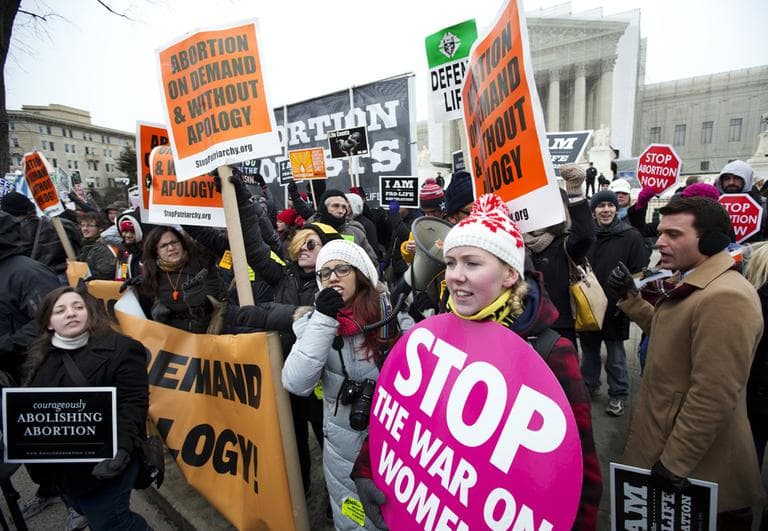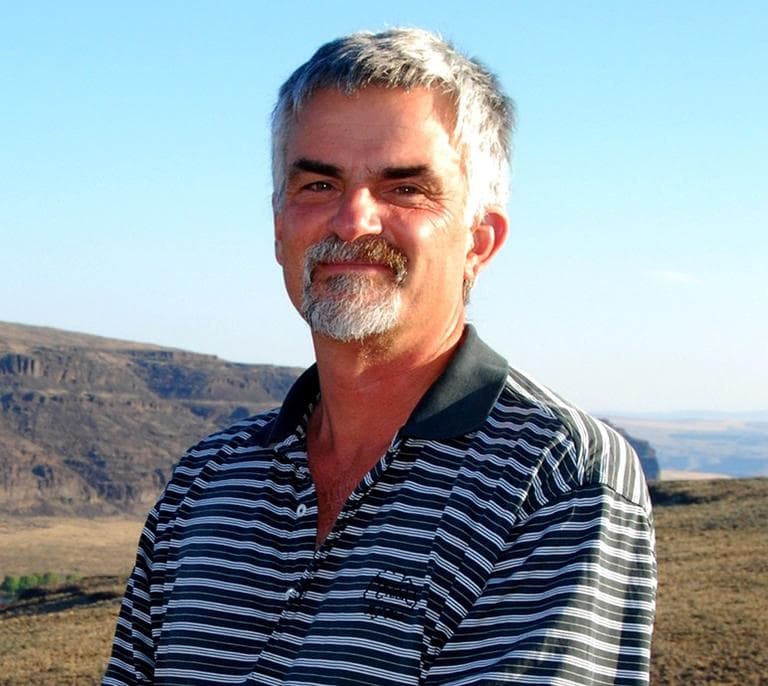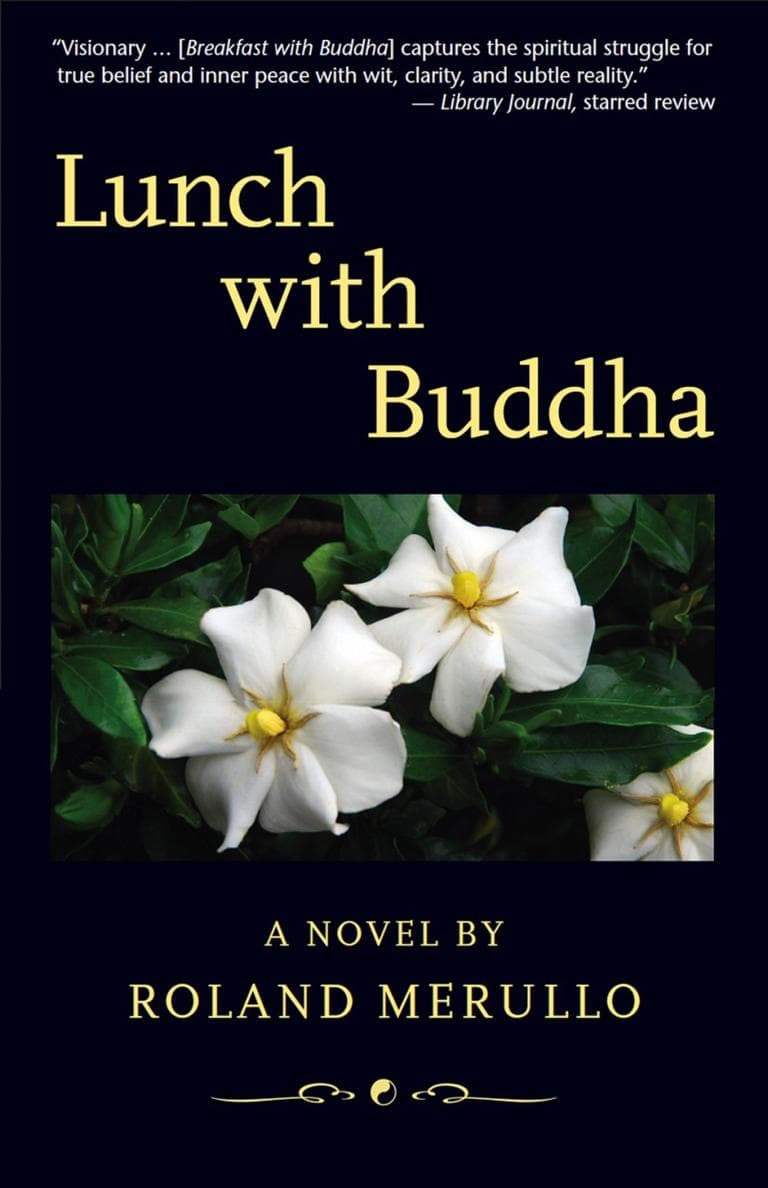Advertisement
Trying To Bridge The Divide Over Abortion
Resume
January marked the 40th anniversary of the Supreme Court decision legalizing abortion.

In the years that have followed Roe v. Wade, the debate over abortion has continued to be polarizing and even violent at times.
There seems to be an impossible divide over abortion, but author Roland Merullo says the two sides must try to find common ground.
Merullo is an author who was raised Catholic. He has friends on both sides of the debate and admits to being in favor of keeping abortion legal.
But he says both sides need to have one goal in mind: reducing the number of unwanted pregnancies. Do that, Merullo says, and the number of abortions will decrease, too.
Do you think it's possible to bridge the divide over abortion? Let us know in the comments or join the debate on our Facebook page.
Note: Merullo's latest novel is Lunch with Buddha, and excerpt of which you will find below:
____Book Excerpt: 'Lunch with Buddha'
By: Roland Merullo____

Chapter 23
Gilligan Neufaren, my author and friend, had recommended a bed-and-breakfast in the hills outside Ennis and a restaurant there called The Continental Divide. I do not, as a rule, like bed-and-breakfasts, nice as so many of them can be. It’s some kind of a quirky privacy issue. I like people. I have a long list of men and women I consider friends. But there are times—and it took Jeannie a while to understand this side of me—when I need to retreat from humanity altogether for an hour or a day, have some quiet time to myself, not feel obliged to be sociable, affable, interested, or talkative.
In this way the Fisherman’s Paradise Bed and Breakfast was not the perfect spot. Before my dinner with Gilligan (who refused to be called “Gill”; he said he liked the rhythm of his full name) I had hoped I’d have half an hour in my own room, meditating perhaps, or thinking of my wife, or pondering the puzzle the visit to Landrea had set before me. For all its manifold psychological levels, that puzzle was actually a very simple one; I see that now. Could a person explore the territory of the interior world, the world that lay beyond the logical thought process, and still keep one foot in the mainstream world of New York business and suburban respectability? Or would there always come a day—after years of meditation and a horrible trauma, say—when one had to make a choice? “Take hold of this,” as the Tao Te Ching put it, “and let go of that.” Rinpoche and my sister had clearly made their choice, not for visions and séances (Celia had, in fact, given up her regressions and palm reading when she moved to North Dakota) but for a contemplative life, an unmeasurable inner pursuit. My neighbors and office mates had clearly made another. I tried, and failed, to imagine Celia at a desk in Midtown, poring over sales numbers, or my boss, Frank Denig, sitting cross-legged on a cushion. It wasn’t so black and white, of course: Celia paid her bills, and there was a chance, however remote, that Frank had a side to him that wasn’t driven by power and status. But after the hour with Landrea I was torn. Since Jeannie’s death my work life, my whole persona there, even my daily getup of sport jacket and shined shoes, had come to feel oddly artificial. Yet people like Celia and Landrea were too dreamy and flaky for me, wandering too far from the herd. I thought about Rinpoche’s talk in Spokane—which seemed now less like a failure and more like a lesson that had been too advanced for me at the time. The point of it was: Don’t make your own life in reaction to others. So maybe the whole trick of the spiritual search was “To thine own self be true.” Maybe the real work was just scraping off layer upon layer of conditioning, assumption, and imitation, and finding, somewhere in the depths, your actual face. Maybe that’s what Rinpoche meant by “you understand you’re not you.”
On the way to our B and B we passed signs showing fish and hook, which I took to mean places where one could put a boat into the river and cast a line. From Gilligan’s descriptions of his summer cabin in the wilds, I knew that this part of the state was supposed to be a fly-fisherman’s paradise, the rivers bubbling with rainbows and browns, men in expensive Orvis outfits standing in boats and flicking an artificial fly across a brown-blue surface. And indeed, after we turned onto a gravel road, wound this way and that up a long hill and pulled into the driveway of the place where we’d arranged to spend the night, we were greeted by a large wooden sign, professionally lettered: ANGLERS WELCOME. The house was set on a hilltop and offered a view of baked hills to the north, and mountains in the eastern distance. There were antelope grazing in the fields below.
Fisherman’s Paradise was run by a couple of friendly folk who’d retired there from Kansas City. Lena suffered from arthritis. Giorgio suffered from an inability to stop talking. Shortly after our arrival we had lemonade on the verandah, gazing down at the view, and within twenty minutes Rinpoche and I had gotten most of the good fellow’s history: his service in Vietnam, his passion for hunting elk, his parents’ courageous move from the grit of Trenton to the friendlier middle west. He and Lena had four sons. We soon learned what each of them did for a living, to whom they were married, and how they were raising their children. Between these factual mile markers stood great stretches of anecdote—everything from the neighbor across the way, who insisted on raising lamas even though there was no money in it, to the long, rambling tale of Giorgio’s ascent from apprentice in an ad agency to owner of a small company that made the fibers used in 79 percent of the world’s toothbrushes.
Lena, for the most part, sat quietly by, occasionally adding a drop to this sea of words. I tried to simultaneously be polite and check my watch. At one point, as Giorgio taped this line onto the trailing edge of the toothbrush story, “And just one more little one from the time we—” Rinpoche’s head lolled over to the left and he let out a snore.
“My brother-in-law’s exhausted,” I explained. “He gets up very early to meditate, and—”
But Rinpoche’s quiet wood-sawing seemed in no way to offend our host. He didn’t even seem to notice. We existed, the good monk and I, as two sets of fresh ears, our own stories unimportant, our schedules secondary.
At last I took advantage of a pause for breath and stood up. I tapped Rinpoche on the shoulder and he was immediately alert, so immediately that I wondered if it had all been an act, a wesson. We made a safe retreat to our separate accommodations—large, airy rooms with identical views and Bibles placed conspicuously on the night tables—settled in, met to review our plans for the next day, wished each other a good night, and then I headed back down the hillside into town.
The Continental Divide occupied a low, modern building a minute and a half north of tiny downtown Ennis. Gilligan Neufaren had already arrived and taken a table, and was at work on a bottle of white. He was six feet five, a former Harvard oarsman, light-skinned and light-haired and living on the proceeds from two very successful books—Breakfast Abroad and Lunch Abroad—that concerned themselves with the morning and afternoon dietary preferences in places as diverse as Zimbabwe and the Islands of Yap. His style was erudite yet conversational, his sense of humor inventive, if touched at times with an acerbic edge, and he’d made both himself and Stanley and Byrnes millions. I’d enjoyed his company on his visits to New York, and I’d been the acquiring editor of Breakfast, so it was a pleasure to see him there, a face from the predictable world.
He poured me a glass from his bottle, conveyed his condolences. We ordered the Caprese salad to prepare our stomachs and made small talk about fishing and road trips. The Caprese was superb, the warm rolls nothing less than spectacular. Carrying in my pants pocket a remnant of East Coast elitism, I’d begun to worry that, in crossing the actual continental divide earlier that day, we were entering a penitential desert of the culinary world. Here was an oasis.
Gilligan ordered the flank steak. I felt obliged, in those parts, to go for the trout, and in the midst of my first taste of it he said, “Word has it you’re traveling with a maharishi.”
“My brother-in-law. He’s a sort-of Buddhist monk. How’d you know?”
Gilligan’s teeth were as oversized as the rest of him. The face was rectangular, papered with a Scandinavian’s pale skin and topped with a boyish shock of yellow hair. The lake-water blue eyes had a happy certainty to them: he expected the best from this world. When he smiled, his ears lifted out and away from each other. “Someone in Denig’s office let it slip.”
“Oh.”
“And I’m not familiar with the sort-of Buddhists. What’s the deal? They sort-of come back from the dead until they qualify for Nirvana? They’re sort-of vegetarians?”
“In his case, yes, actually. He eats a little meat.”
“And he’s your brother-in-law, you said? Not celibate?”
“I don’t ask. That’s my sister’s business, I guess.”
“No offense meant.”
“None taken. This trout is excellent.”
“So’s the steak. But what’s the deal? I mean, you get what, three weeks off a year?”
“Eighteen days.”
“I’d expect you to go out to the Hamptons with your kids or up to the Berkshires to golf with Denig or something. You’re driving around with a monk? In Montana? Does he fish?”
“He might. We’re going to Yellowstone tomorrow. I might ask around for a guide.”
“Look up Danny Schoen if you’re anywhere near the Little Bighorn. World class.” Gilligan pondered a moment, sliced his steak neatly, chewed it thoughtfully, like the professional food-man he was. Unmarried, childless, free to travel the world with one or another in a series of marvelous women, there seemed to be a species of magic associated with him. Good things happened to him, extraordinarily good things. His Harvard crew had won at Henley. His books were fine, solid books, aimed toward the layperson’s end of the food audience. Well put together, informative, funny, but, I feel obliged to say, not in any way exceptional. In someone else’s hands they would have sold ten or twelve thousand copies, perhaps gone into paperback and sold another few thousand a year to a claque of ardent fans. We had dozens like that on our backlist. Somehow, though, both Breakfast and Lunch had caught on, gone mainstream, found their way into twenty languages and almost a million households. Jeannie’s friends read them around the pool at the tennis club. College kids read them on the commuter trains. There had even been a pair of film options—exceedingly rare in my corner of the book business.
Gilligan seemed to expect all that, to bring it into his life the way others, more negative, brought on disaster. It wasn’t conceit you detected in his bearing and tone of voice as much as a complete lack of surprise that the world should have rewarded him with a life so many people envied. He was fond of referring to his style as “the Neufaren way”.
“You know,” he said, “you’re kind of an odd duck.”
“I’m the least odd duck in the world.”
He laughed, handed his empty dish to the waitress, convinced me to go for the pear tart and coffee, a glass of port. Outside the big windows the late Montana twilight moved in leisurely fashion toward night, no sense of rush here. We might have been reviving the lost art of the two-hour publisher’s lunch.
“No, really,” he persisted. “Denig said he went into your office and found you meditating or something.”
“Once. It was lunch hour. Jeannie was dying. I was under tremendous stress.”
“An awful thing. Sorry again, pal.”
“Thanks.”
“But, you know, meditation, the monk, the road trip out here when you don’t fish. What’s the real Otto Ringling story?”
Gilligan couldn’t help himself. This was how he made his living, getting people to talk, working them like a massage therapist, pressing the tissue here and there until the pain, the quirkiness, the frustration, or the secret recipe leaked out into air. I felt—unusual for me—vaguely intimidated. I sipped the port and stalled.
“Out with it, man.”
“You’re intrigued by the way other people eat,” I said. “I’m intrigued by the way other people live. By the idea that maybe we shouldn’t be making some of the assumptions we make.”
“Such as?”
“Such as that the main purpose of our being here is to earn money and collect things and pleasures and insulate ourselves from discomfort to the extent humanly possible before the hour of our death.”
He stopped eating. “Wow!”
I tried to smile it away. I suddenly had a new appreciation for the manner in which my father and mother had used words, as if they were a collection of golden coins to be set out in plain view very very carefully, and only in front of certain trustworthy merchants.
“You some kind of socialist or something? Income redistributor? That’s a joke. But this is unusual. I mean, I encounter this from time to time. In my travels I run into people who say things like that. But most of the others, most of the Liberians and Lithuanians and Cape Verdeans, the vast majority of them would be all too happy to make money and collect things and pleasures and have a little less discomfort.”
“Sure, of course. I didn’t mean that.”
“Clarify, if you would.”
“I suppose I just feel like I have everything I need.”
“Always more women out there to get to know,” he said carelessly, and then he caught himself and said, “Sorry, you know how I meant it,” and offered me the last bite of his pear tart in apology.
I waved them both away, pear tart and careless remark. “I know what you mean. But don’t you ever feel like there might be something else to life? If you stop for a second and look around?”
“Don’t want to stop, man. Having too much fun.”
“I want to say my parents’ dying—they were killed in a car crash six years ago—and then Jeannie’s death, I want to say those were the things that made me, I don’t know, question. But the truth is, even before those tragedies I was looking around and asking myself, ‘What’s going on here?’ Even as a kid.”
“I had a spell of that, too,” he said. “I looked around and I saw that some people had a summer home on Martha’s Vineyard or a yacht in Monaco, and other people were sweltering in housing projects and I thought: Let me figure out a way to get into that former group and stay there.” He signaled the waitress that he wanted the check, and no amount of protesting on my part could convince him otherwise.
“And you did it.”
A nod. “And it’s as much fun as it looks, believe me.”
“Really?”
Just for one second then, just for one snippet of an instant, the crew shell wobbled, one or two of the oarsmen falling out of time, or stroke, or whatever the correct term might be. The big rainbow trout slipped off the hook. The sexy woman said no, she didn’t really want to go with him to Kazakhstan, interesting as the name sounded. I might have imagined what I saw in that second, but I don’t think so. It was similar to reading a novel and coming across a moment when you say to yourself, That’s false, a false note. It doesn’t ruin the whole book any more than Gilligan’s flash of doubt broke apart his uber-confidence, but it was memorable nonetheless.
He seemed to be aware of it, too, seemed to feel the need to recover. “You know,” he said, signing the credit card slip with a flourish and slipping his wallet into a jacket pocket. “I’ve seen a bit of illness and death in my travels. I don’t need to tell you this, probably, but there’s nothing redemptive about it, nothing fine, no lessons to be learned. I stay as far away from it as I possibly can.”
But you can’t, I wanted to say. Not forever. Doesn’t that matter?
Gilligan was stretching his wide shoulders back, admiring the view. No more of this depressing talk, his body language seemed to say. I inquired about his next project, Dinner Abroad—we’d already given him a healthy advance, and we talked about that as we stepped out into the still warm air. Night now. A bloom of stars over the mountains’ dark silhouette. Gilligan shook my hand in a way that made me feel almost his equal, a good editor, a good man—if older, shorter, chubbier, grumpier, and less rich.
“Where to next?” he asked.
“Yellowstone, Billings, then back to the farm.”
“South Dakota, yes.”
“North. Near Dickinson. Not much in the way of great fishing or food there.”
He smiled. “Don’t go too far into that navel-gazing stuff,” he advised. “That way lies sorrow.”
We parted friends. I stood in the parking lot and watched him drive off.
Guest:
- Roland Merullo, author of "Lunch with Buddha." He tweets @RolandMerullo.
This segment aired on February 4, 2013.